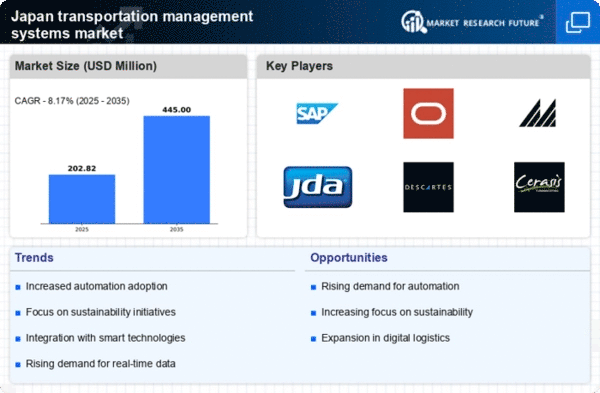Growing E-commerce Sector
The rapid expansion of the e-commerce sector in Japan is a significant driver for the transportation management-systems market. As online shopping continues to gain popularity, the demand for efficient logistics and delivery solutions is escalating. E-commerce companies require robust transportation management systems to handle increased order volumes and ensure timely deliveries. The e-commerce market in Japan is projected to reach $200 billion by 2025, further emphasizing the need for advanced transportation management solutions. This growth presents an opportunity for transportation management system providers to cater to the unique needs of e-commerce businesses, thereby driving innovation and growth within the market.
Increased Focus on Data Analytics
The transportation management-systems market in Japan is witnessing an increased focus on data analytics as organizations seek to harness the power of big data. Companies are increasingly recognizing the value of data-driven decision-making to enhance operational efficiency and customer satisfaction. The integration of analytics into transportation management systems allows for better route optimization, demand forecasting, and performance monitoring. Recent studies indicate that businesses utilizing data analytics in logistics can achieve cost reductions of up to 15%. This trend suggests that the transportation management-systems market will continue to evolve as companies prioritize data analytics to gain a competitive edge and improve their overall logistics performance.
Emphasis on Supply Chain Resilience
The transportation management-systems market in Japan is increasingly influenced by the emphasis on supply chain resilience. Recent disruptions in global supply chains have prompted companies to reassess their logistics strategies. Organizations are now prioritizing the implementation of transportation management systems that enhance flexibility and adaptability. This shift is likely to lead to a more robust and resilient supply chain, capable of withstanding unforeseen challenges. As companies invest in technology that supports supply chain resilience, the transportation management-systems market is expected to experience growth. This driver highlights the critical role of transportation management systems in fostering a resilient logistics environment in Japan.
Rising Demand for Efficient Logistics Solutions
The transportation management-systems market in Japan is experiencing a notable surge in demand for efficient logistics solutions. This trend is driven by the increasing complexity of supply chains and the need for real-time visibility. Companies are seeking to optimize their operations to reduce costs and improve service levels. According to recent data, the logistics sector in Japan is projected to grow at a CAGR of 4.5% through 2027, indicating a robust market for transportation management systems. As businesses strive to enhance their operational efficiency, the adoption of advanced transportation management systems becomes essential. This driver highlights the necessity for organizations to invest in technology that streamlines logistics processes, thereby fostering growth in the transportation management-systems market.
Government Initiatives for Infrastructure Development
Government initiatives aimed at enhancing infrastructure in Japan are significantly impacting the transportation management-systems market. The Japanese government has allocated substantial budgets for the development of transportation networks, including roads, railways, and ports. This investment is expected to reach approximately $100 billion by 2026, facilitating smoother logistics operations. Improved infrastructure not only enhances the efficiency of transportation but also encourages the adoption of advanced management systems. As infrastructure improves, companies are likely to invest in transportation management systems to leverage these advancements, thereby driving growth in the market. This driver underscores the importance of government support in shaping the future landscape of transportation management in Japan.
















